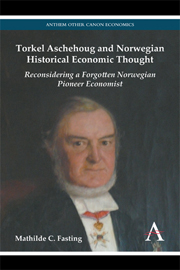 Torkel Aschehoug and Norwegian Historical Economic Thought
Torkel Aschehoug and Norwegian Historical Economic Thought Book contents
- Frontmatter
- Contents
- Acknowledgements
- Chapter 1 Introduction
- Chapter 2 Biography
- Chapter 3 Norwegian Economic and Political Context in the Nineteenth Century
- Chapter 4 Norwegian Economic Thought and Method
- Chapter 5 Development of the Economic Thought of Aschehoug: Statsøkonomisk Forening and the Socialøkonomik Project
- Chapter 6 The German Historical School: Similarities, Influences and Discrepancies
- Chapter 7 Alfred Marshall: Aschehoug and the Adoption of Marginal Theory
- Chapter 8 The French Influence: Adopting Say and Refuting Socialism
- Chapter 9 Views of Labour in the Work of Aschehoug
- Chapter 10 The Entrepreneur: The Fourth Production Factor
- Chapter 11 Trade and Customs Debates from 1840 to 1906
- Chapter 12 The Theory of Economic Crises
- Chapter 13 The Legacy of Aschehoug: Concluding Remarks
- Appendix A Other Norwegian Turn-of-the-Century Economists
- Appendix B Drafts for Socialøkonomik
- Appendix C Detailed Contents of Socialøkonomik (First Editions from 1903 to 1908)
- Notes
- Literature
- Index
Chapter 9 - Views of Labour in the Work of Aschehoug
Published online by Cambridge University Press: 05 March 2014
- Frontmatter
- Contents
- Acknowledgements
- Chapter 1 Introduction
- Chapter 2 Biography
- Chapter 3 Norwegian Economic and Political Context in the Nineteenth Century
- Chapter 4 Norwegian Economic Thought and Method
- Chapter 5 Development of the Economic Thought of Aschehoug: Statsøkonomisk Forening and the Socialøkonomik Project
- Chapter 6 The German Historical School: Similarities, Influences and Discrepancies
- Chapter 7 Alfred Marshall: Aschehoug and the Adoption of Marginal Theory
- Chapter 8 The French Influence: Adopting Say and Refuting Socialism
- Chapter 9 Views of Labour in the Work of Aschehoug
- Chapter 10 The Entrepreneur: The Fourth Production Factor
- Chapter 11 Trade and Customs Debates from 1840 to 1906
- Chapter 12 The Theory of Economic Crises
- Chapter 13 The Legacy of Aschehoug: Concluding Remarks
- Appendix A Other Norwegian Turn-of-the-Century Economists
- Appendix B Drafts for Socialøkonomik
- Appendix C Detailed Contents of Socialøkonomik (First Editions from 1903 to 1908)
- Notes
- Literature
- Index
Summary
Different dimensions in the debate on labour and work are used by Aschehoug to present the general approach and ethics embedded in his economics. The main findings can be summed up as follows: Aschehoug represents a ‘multidimensional’ economics, giving a broad, nuanced picture that draws on economics as well as psychology, philosophy, sociology and other human sciences. As a consequence, workers are not considered merely as production factors, but as human beings having human needs. Balabkins underlines exactly the same point in his discussion about the German/Austrian economist Albert Schaffle — one of Aschehoug's contemporaries who had almost the same lifespan. Balabkins points out that Schaffle ‘brings into a wider perspective that economics is a science about the complex living organism called Homo sapiens. […] The human being was not a commodity.’ Furthermore, he describes Schäffle as being ‘not a typical contemporary one-dimensional mathematical economist, possessing statistical prowess but lacking erudition in economic history or geopolitics, or rudiments of sociology’. Though none of Aschehoug's contemporaries could be considered one-dimensional, the trend towards a specialized scientific mathematically based economics was on its way.
In the following discussion, views on labour will be used as examples to demonstrate that Aschehoug the economist favoured ‘economics with a human face’. A warning can be discerned in Aschehoug's text on work: ‘Follow my advice! Otherwise, labour productivity will be affected negatively, your nation's competitive advantages reduced, and the quality of life of workers negatively affected. And last but not least, the moral standards of society deteriorate.’
- Type
- Chapter
- Information
- Torkel Aschehoug and Norwegian Historical Economic ThoughtReconsidering a Forgotten Norwegian Pioneer Economist, pp. 141 - 152Publisher: Anthem PressPrint publication year: 2013


